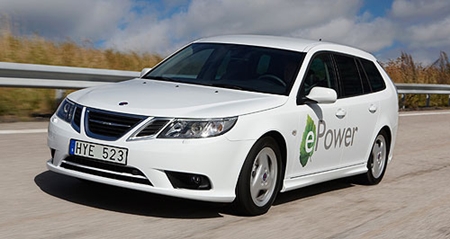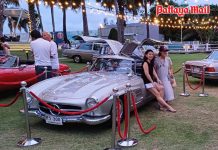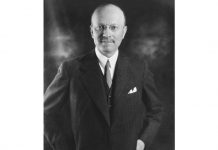The marque SAAB which looked as if it had been consigned to history forever, may have become another Phoenix in more ways than one. A Chinese-Japanese consortium has agreed to buy the bankrupt Swedish automaker and plans to specialize as an electric vehicle manufacturer.
SAAB stopped production last year and filed for bankruptcy in December after take-over talks failed when former SAAB owner and major stakeholder General Motors refused to permit the transfer of technical licenses to any restructured company involving Chinese manufacturers.
 Electro-SAAB
Electro-SAAB
However, a consortium, known as National Electric Vehicle Sweden (NEVS), has paid an undisclosed sum to secure the main assets of Saab Automobile including its manufacturing facilities in Trollhattan, Sweden, and the rights to the current 9-3 and their new vehicle platform also known as Phoenix (coincidence?).
The NEVS consortium is 51 percent owned by Hong Kong-based National Modern Energy Holdings Ltd – a company that designs and builds biomass energy powerplants for China – and 49 percent owned by Japanese investment firm Sun Investment, which has a particular focus on hi-tech, eco-oriented projects.
An electric vehicle based on the 9-3 and built at Trollhattan will be the proposed first model produced and will be sold primarily in the fast-growing Chinese market from late next year or early in 2014.
However, NEVS has confirmed it has global sales and marketing aspirations, and that a second Phoenix-based model will follow using “additional cutting-edge technology” from Japan. This certainly makes SAAB another Phoenix.
It is likely that a new EV from the new SAAB company would use the previous SAAB show-car technology with an 135 kW electric motor driving the front wheels through a single-speed transmission, with the SAAB ePower concept car claimed to offer 0-100 km/h acceleration in 8.5 seconds, a 150 km/h top speed and a driving range of up to 200 km.
SAAB also signed a deal with BMW a couple of years ago for use of its 1.6-liter four-cylinder turbo-petrol engine (as seen in Mini models), which has the potential to turn up in a plug-in hybrid electric vehicle built China is the key destination for the new EVs, but the global nature of the SAAB brand meant its distribution should go well beyond China.
NEVS said in a statement that it aims to become a leading manufacturer of electric vehicles and is currently recruiting automotive engineers to work at the Trollhattan site to bring the ePower to market in collaboration with Japanese and Chinese engineers.
“We will match Swedish automobile design and manufacturing experience with Japanese EV technology and a strong presence in China,” said NEVS chairman Karl-Erling Trogen.
“Electric vehicles powered by clean electricity are the future, and the electric car of the future will be produced in Trollhattan.”
Founder of majority shareholder National Modern Energy Holdings, Kai Johan Jiang, said, “China is investing heavily in developing the EV market, which is a key driver for the ongoing technology shift to reduce dependence on fossil fuels. The Chinese can increasingly afford cars; however, the global oil supply would not suffice if they all buy petroleum-fuelled vehicles. Chinese customers demand a premium electric vehicle, which we will be able to offer by acquiring SAAB Automobile.”




